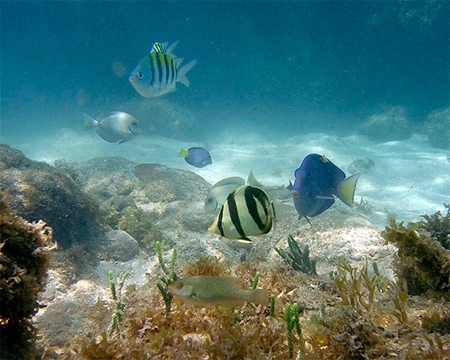

Comprising more than 120 researchers, BIOTECMAR aims to drive innovation based on more extensive knowledge of marine biodiversity (photo: Allan Allants / Wikipedia)
Comprising more than 120 researchers, BIOTECMAR aims to drive innovation based on more extensive knowledge of marine biodiversity.
Comprising more than 120 researchers, BIOTECMAR aims to drive innovation based on more extensive knowledge of marine biodiversity.

Comprising more than 120 researchers, BIOTECMAR aims to drive innovation based on more extensive knowledge of marine biodiversity (photo: Allan Allants / Wikipedia)
By Maria Fernanda Ziegler | Agência FAPESP – In 2016, Brazilian researchers discovered a reef in the mouth of the Amazon River. The area of the Great Amazon Reef is approximately 56,000 square kilometers. Its discovery has been widely celebrated and has led to many other findings that could serve as starting points for the development of new technologies.
For example, a recent study identified a new group of sponges with outstanding biotechnological potential and named it Arenospicula (Niphatidae). Carbonate organisms, mollusks and sponges inhabiting the reef and consisting of unknown molecules and genes have been considered sources of nutrients for soil fertilizer, cancer drugs, medications for the treatment of infectious diseases, and even heparin production, among many other possible applications.
To support this kind of innovative research, develop the marine bioeconomy and address the competitive challenges involved, the Brazilian government has established the National Marine Biotechnology Research Network (BIOTECMAR).
“These examples and many other finds show how much remains to be done in exploring marine biodiversity. To this end, BIOTECMAR is interested in discovering new species, mapping new genes and finding out more about the interaction between microorganisms and macroorganisms,” said Roberto Berlinck, Full Professor at the University of São Paulo’s São Carlos Chemistry Institute (IQSC-USP), a member of BIOTECMAR, and a member of the steering committee of the FAPESP Research Program on Biodiversity Characterization, Conservation, Restoration and Sustainable Use (BIOTA-FAPESP).
“We also want to understand important processes such as coral bleaching and how corals produce toxins. Our goal is to leverage the significant innovative potential of this knowledge,” Berlinck told Agência FAPESP.
An article published in the journal Cell by BIOTECMAR researchers highlights the use of metagenomics and single-cell genomics to discover genes that encode bioactive molecules in sponges, corals and rhodoliths.
Sponsored by the Ministry of Science, Technology, Innovation and Communications (MCTIC), BIOTECMAR links more than 120 researchers from all regions of Brazil. Several of its members have a long career in biotechnology behind them, including Wagner Valenti, a senior research scientist affiliated with São Paulo State University (UNESP), and Paulo Mourão, a professor at the Federal University of Rio de Janeiro (UFRJ). The idea is to conduct innovative research in biodiversity, prospecting, genomics and postgenomics and to transfer knowledge to the productive sector.
Unknown biodiversity
In an article published in the journal Frontiers in Marine Science, BIOTECMAR researchers present a review of recent studies and discoveries with significant innovation potential.
“Above all, BIOTECMAR aims to develop not just applied research of a marine origin but also new products for use by industry, such as enzymes, pigments, food supplements, and food from marine organisms and marine aquaculture,” said Fabiano Thompson, first author of the article and coordinator of BIOTECMAR. “Marine biodiversity can be considered a huge and unexplored submerged pharmacy, as well as a rich source for biotechnology.” Thompson is a professor in the Biology Institute of the Federal University of Rio de Janeiro’s Alberto Luiz Coimbra Institute for Graduate Studies and Research in Engineering (COPPE-UFRJ).
According to Thompson, biodiversity is known to be the basis for marine biotechnology and a potential asset for the bioeconomy in a country with more than 7,400 km of coastline, but a substantial proportion of Brazil’s rich endemic marine biodiversity is unexplored.
“We know only a small part of the marine biodiversity along the coast of Brazil, and this is a problem. Research on marine biodiversity is a worldwide concern. It’s no accident that there are such large-scale international circumnavigation projects as the Spanish Malaspina Expedition and the Franco-German Tara Oceans Expedition, designed to study the diversity of genes in the marine environment for technological applications,” Thompson told Agência FAPESP.
Brazil is investing less than other countries, he acknowledged, but the network will accelerate the accumulation of knowledge “so that within ten years, we’ll be closer to the international level in marine biotechnology”.
The creation of a national network was called for by the Ninth Sectoral Plan, which was drawn up in 2016 by the Interministerial Commission for Resources of the Sea.
“There are several projects, some of them conducted by teams, such as the Thematic Project funded by FAPESP for which I’m principal investigator, for example. Others are more individual, but generally speaking, the researchers are participating in BIOTECMAR in different ways,” Berlinck said.
Berlinck is principal investigator for the Thematic Project “Biodiversity components of Brazilian Islands and their metabolic characters – an integrated approach”.
Republish
The Agency FAPESP licenses news via Creative Commons (CC-BY-NC-ND) so that they can be republished free of charge and in a simple way by other digital or printed vehicles. Agência FAPESP must be credited as the source of the content being republished and the name of the reporter (if any) must be attributed. Using the HMTL button below allows compliance with these rules, detailed in Digital Republishing Policy FAPESP.





